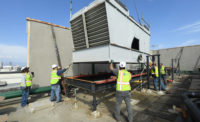Despite skyrocketing construction unemployment, most companies are trying to hold steady on compensation to retain existing talent and stay competitive during the recession. Although many firms are trying to keep raises in line with cost-of-living increases, others are freezing salaries. Nearly 20% of respondents to a survey conducted by construction-compensation consulting firm PAS Inc. say they would not increase salaries this year, but only 1% say they would reduce them.
For 2009, anticipated salary increases ebbed to 3.58% among companies that plan to give raises, reports Saline, Mich.-based PAS. After seeing increases head above 4% between 2006 and 2008, current rates have settled close to the 2003 level of 3.69%. The drop in rates is being felt nationwide, as the survey shows every region reporting decreases of 0.4% or more from last year. “Six months ago, we saw some regions that were immune,” says Jeff Robinson, president of PAS. “Now everyone is feeling the impact.”
Robinson says, in the short term, salary freezes might seem logical, but they could have consequences. “We’ve got a large group of people on the verge of retirement,” he says. “If you freeze wages, they will eventually just decide to retire or take their skills somewhere else. By the time we pull out of this recession, there could be a serious talent drain.”
As commercial and residential building market continues to crash in many U.S. markets, recruiters say companies are looking to other sectors for projects and searching for qualified staff to win new opportunities. Many firms are trying to position themselves for public-sector and infrastructure jobs. “No one needs a basic commercial project manager at this point,” says Paul Marchionna, senior managing director at Specialty Consultants, Pittsburgh. “They are looking for people with very specific skill sets that match where the market is going.”
Rather than hiring new staff, companies are moving key employees from now less-active markets, such as commercial and residential, into public sectors still generating work. Michael Ketner, president of Pittsburgh-based Michael L. Ketner & Associates, is concerned that staffers used to winning negotiated work from private developers may be less comfortable in a hard-bid environment. “They are very different worlds, and companies could end up losing deals or making bad deals as a result,” he says.
Where there is demand, compensation is holding up, says Ketner. “Everyone wants to think it’s a buyer’s market on new hires, but if the person you’re seeking has the type of skills that people need right now, you still have to pay for it,” he says. “[Employers] aren’t getting bargains.”
But senior-level executives are feeling the pain in bonus packages. “Last year was a big bonus year for many firms,” Robinson says. “Those people with a variable pay component will take a big hit this year.” Ketner says bonus-package dilemmas are complicating compensation discussions. “In some cases we’ve seen people have to bump up base pay or make a first-year guarantee [on a bonus],” he says.
Frank Bruckner, executive vice president at Kimmel & Associates, Asheville, N.C., sees firms rehiring former senior-level staffers whose 401Ks have tanked. “There are talented people willing to work part-time,” he says.
Tom Helbling, president of Helbling & Associates, Wexford, Pa., says every company faces a particular set of circumstances. “I’ve been [a recruiter] for 30 years and I’ve been through several recessions, but none of us has witnessed anything to this extent,” he says. “Every company is trying to figure out where they are, where they want to be and who they need right now.”


Post a comment to this article
Report Abusive Comment